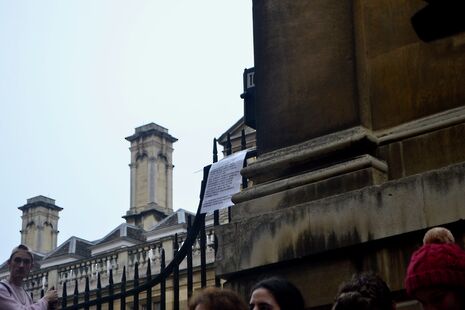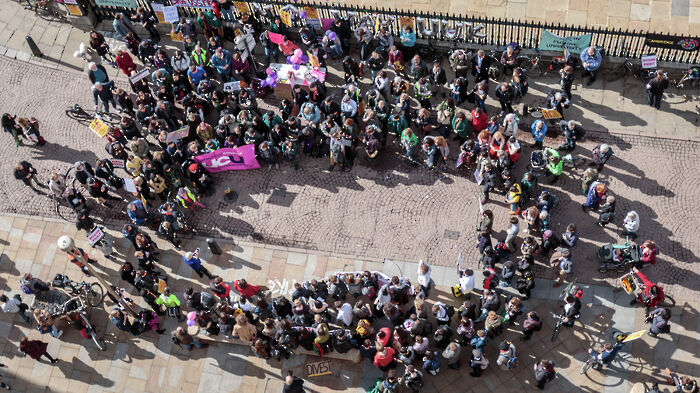Analysis: Under heightened scrutiny, can University Council evolve?
Next month, five new members will take up their role on the decision-making body – is it capable of change?

Throughout the USS pensions dispute, a sense of a disconnect between academics and staff, and senior University administration, came to the fore in a decade-long culmination of frustration among academics with the status quo.
In a Senate House discussion in March shortly after strike action ceased, one academic said: “All staff want is to know that the University is advocating on their behalf”. And throughout, calls for Cambridge to lead the sector in advocating for its staff, through the actions of Council and words of the vice-chancellor, reverberated.
Both in the pensions dispute and on other keystone issues over the past year, the question of whether Council is adequately acting on its democratic mandate has emerged, as engagement reached new levels.
Council’s perceived distance from staff is compounded by its institutional rigidity
In October, Council member Dr Alice Hutchings resigned her position in protest of an amendment by Council to impose a qualifying period for Regent House membership of “at least three years continuously” for research associates. She called the approval of the amended Grace a “damning indication of how researchers in the University are perceived: as second-class citizens”.
Dr Hutchings also joined three other members of Council in submitting notes on the Council’s decision against full divestment in June. Alongside fellow Council member Professor Nick Gay, Dr Hutchings criticised that as Council members, they had invested interests in the University’s finances, “and yet… are denied the information required to make an informed decision about disinvestment”. They highlighted that “repeated requests” to then-Chief Investment Officer Nick Cavalla on identities of external fund managers, and the composition of investment portfolios, had been refused.
In the new year, six new members of Council will take up their posts. Drs Andrew Sanchez and Sam Ainsworth – both of whom received backing from Cambridge UCU and Zero Carbon – will replace Hutchings and Jesus College Bursar Dr Richard Anthony, while prominent pro-divestment campaigner Dr Jason Scott-Warren will succeed Professor Ross Anderson.
“You only have to look at the current mechanism for Discussions to see there are flaws”
“Cambridge has an ostensibly democratic structure but its mechanisms are opaque to most academics and students, and there is a yawning gap between staff and senior management”, said Dr Scott-Warren.
“Most members of the University are not currently getting a proper say in its future development, and this is a situation that we need to redress”.
Council’s perceived distance from staff and students is compounded by its institutional rigidity. Dr Ruth Charles, a member of Council speaking in a personal capacity, noted that “you only have to look at the current mechanism for Discussions to see there are flaws: carefully prepared speeches are read out in an almost deserted Senate House on a Tuesday afternoon.
“In the 21st Century there are better ways of conducting University business in an open and transparent manner, and at the same time enabling more people to easily access and participate,” Dr Charles added. “Our strength comes from the fact that we are a self-governing community – this breaks down if only a small number of people are actively involved.”
The new members will likely discuss future changes to the Universities Superannuation Scheme, the national pensions scheme for higher education staff, which will be carrying out a valuation of its deficit in upcoming months. The second phase of the North West Cambridge development, a multi-million dollar development project which has seen past controversy over its mismanagement in recent years, is also likely to spur discussion.
“It’s clear that this is an area where scrutiny and accountability is ever more important”, said Dr Charles on the upcoming second phase of the project.
The USS pensions dispute, and the questions of representation it has brought forward, is likely to feed into a breadth of issues circulating in Cambridge’s academic circles.
Another incoming Council member, Dr Sam Ainsworth, has emphasised bringing forward voices of early-career researchers at the University level. He described a contradiction of a cohort of research associates “vital to the functioning of the University’s research output,” but which he argued “the University has never fully understood how to provision for”.
“I believe that our recent disenfranchisement can in fact be used as a catalyst to bring about positive change by drawing attention to this critical issue”, he added.
How Council responds to future developments of the pensions dispute and the role of post-doctorate staff in decision-making – among other issues – will shape its perception as a institution meant to be accountable to Regent House.
Incoming member Dr Andrew Sanchez spoke to Varsity shortly after his election to Council: “I would not have stood for election if I thought that the Council was incapable of functioning in an accountable and responsible manner”. The Council’s perception among its staff will be contingent on its ability to be held up to due scrutiny, and to evolve its decision-making mechanisms so that they ring transparent with those they seek to represent.
 News / Police to stop searching for stolen Fitzwilliam jade17 April 2024
News / Police to stop searching for stolen Fitzwilliam jade17 April 2024 News / Copycat don caught again19 April 2024
News / Copycat don caught again19 April 2024 Interviews / ‘It fills you with a sense of awe’: the year abroad experience17 April 2024
Interviews / ‘It fills you with a sense of awe’: the year abroad experience17 April 2024 News / Night Climbers call for Cambridge to cut ties with Israel in new stunt15 April 2024
News / Night Climbers call for Cambridge to cut ties with Israel in new stunt15 April 2024 News / Acting vice-chancellor paid £234,000 for nine month stint19 April 2024
News / Acting vice-chancellor paid £234,000 for nine month stint19 April 2024






